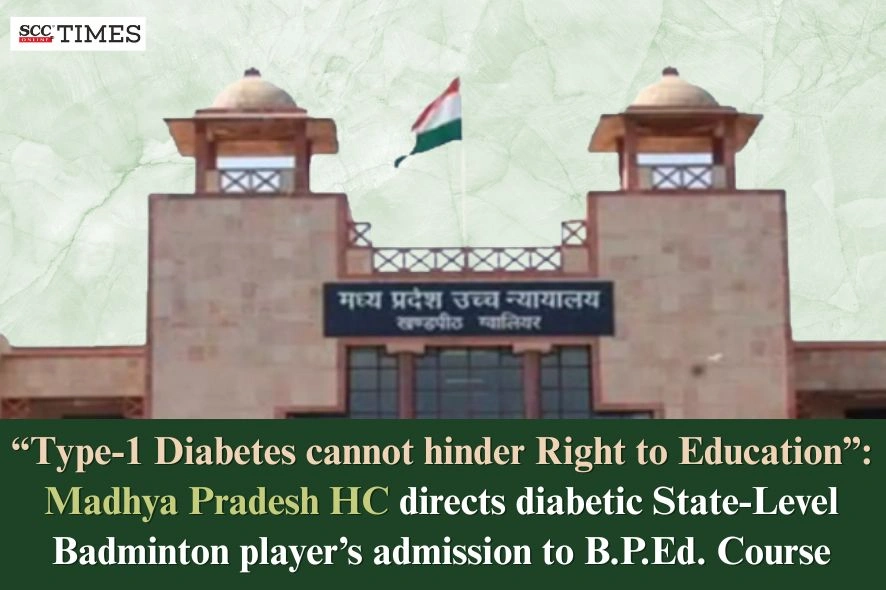Disclaimer: This has been reported after the availability of the order of the Court and not on media reports so as to give an accurate report to our readers.
Madhya Pradesh High Court: In a writ petition filed by a State-Level Badminton Player against the rejection of his admission in the B.P.Ed. Course (“the Course”) due to his Type-1 diabetes, the Division Bench of Anand Pathak* and Pushpendra Yadav, JJ., allowed the petition and directed the petitioner’s admission, holding that the respondents’ refusal to provide minimal dietary flexibility or safe insulin storage, both of which petitioner volunteered to manage at his own cost, constituted denial of reasonable accommodation and hence, discrimination per se.
Background
The petitioner was a State-Level Badminton player who applied for admission in the Course for the academic session of 2025-26. To obtain admission in the Course, the petitioner cleared the written examination and the physical and skill test conducted, wherein he opted for badminton as his specialized sport. He was issued an allotment letter and asked to report for document verification and medical examination at the respondent University. After the said medical examination, he was denied admission because he was a Type-1 diabetic patient. Aggrieved, he filed the present petition.
Analysis
At the outset, the Court noted that the petitioner was a District and State-Level Badminton player. He matched the same physical standards as required in the Course while competing in State and District Level Badminton events. The Court further noted that he further undertook via an affidavit that he would take full responsibility for any eventuality, thereby absolving the institution from any liability.
The Court stated that it was common knowledge that every Indian mess contained basic food items like Roti, Dal, Sabji, Rice, and Curd, which are medically suitable for a diabetic patient. He also undertook to manage insulin injection by keeping it either in a mini refrigerator in his hostel room at his own cost, without any financial or logistical burden to the Institute, or in the mess refrigerator. Both options were manageable.
The Court emphasised that it was not an examination that gave the petitioner an appointment to a post. It was an admission given to the student to pursue the B.P.Ed. Course. Therefore, the right to pursue education cannot be hindered on the pretext of Type-1 diabetes.
“No person shall be subjected to forfeiture of his claims to education or other similar pursuits of life (occupation/profession) on account of his disability.”
In this regard, the Court referred to Anmol v. Union of India, 2025 SCC OnLine SC 387, Omkar Ramchandra Gond v. Union of India, (2024) 14 SCC 158, and Om Rathod v. Director General of Health Services, 2024 SCC OnLine SC 3130. The Court stated that in Anmol (supra), the Supreme Court held that the exclusion of a candidate with disability based on rigid or mechanical medical criteria without individualized functional assessment is violative of Articles 14 and 21 of the Constitution and contrary to the Rights of Persons with Disabilities Act, 2016 (“RPWD Act”). It was observed by the Court that a case-by-case functional assessment must replace the “one size fits all” approach.
The Court noted that AIIMS, Jodhpur, had also clarified that the petitioner only required extra snacks before extended physical activities, which was a simple and manageable precaution in eventuality of a sudden fall in blood sugar. Furthermore, the petitioner carried a medical ID issued by AIIMS, and the respondent University had a fully functional health center and ambulance facilities within the campus to handle any emergency.
Noting the aforesaid, the Court held that all these aspects were in favour of the petitioner, and the objection raised by the respondents appeared to be preposterous.
Upon perusal of the several sports personalities with type-1 diabetes, the Court remarked that, “all these examples indicate that ‘if there is a will, there is a way’. If those players could overcome their disease, then one chance deserves to be given to the petitioner to fight and overcome.”
The Court stated that when the legislature framed the new RPWD Act, where provisions were made to give admission to a person with disability, then the petitioner could not be denied admission in the absence of any categorization of disability. Even if it was categorised, the principle of reasonable accommodation as provided under Section 2(y) of the RPWD Act is a statutory right flowing from Articles 14, 19, and 21 of the Constitution. Thus, the Court held that any denial of such accommodation amounts to discrimination.
“The respondents’ refusal to provide minimal dietary flexibility or safe insulin storage, both of which petitioner volunteered to manage at his own cost, constitutes denial of reasonable accommodation and hence discrimination per se. Even otherwise, Type-1 diabetes is not a recognized disability; therefore, exclusion of the petitioner on this ground is arbitrary and discriminatory.”
Thus, the Court held that the petitioner had made out his case for admission in the Course, and the respondents, without any justified stance, denied him admission. Accordingly, the Court allowed the petition and directed the respondent University to grant him admission without any delay, and if the petitioner was pursuing education, then he was permitted to pursue the education. The respondents were also directed to cooperate if required for the storage of insulin or intake of extra snacks by the petitioner. Petitioner shall also take due care in this regard and be permitted to appear in the upcoming examination.
[Pragyansh Tak v. Union of India, 2025 SCC OnLine MP 8645, decided on 07-11-2025]
*Judgment authored by: Justice Anand Pathak
Advocates who appeared in this case:
For the petitioner: Prashant Sharma
For the respondent: Deputy Solicitor General Praveen Kumar Newaskar



